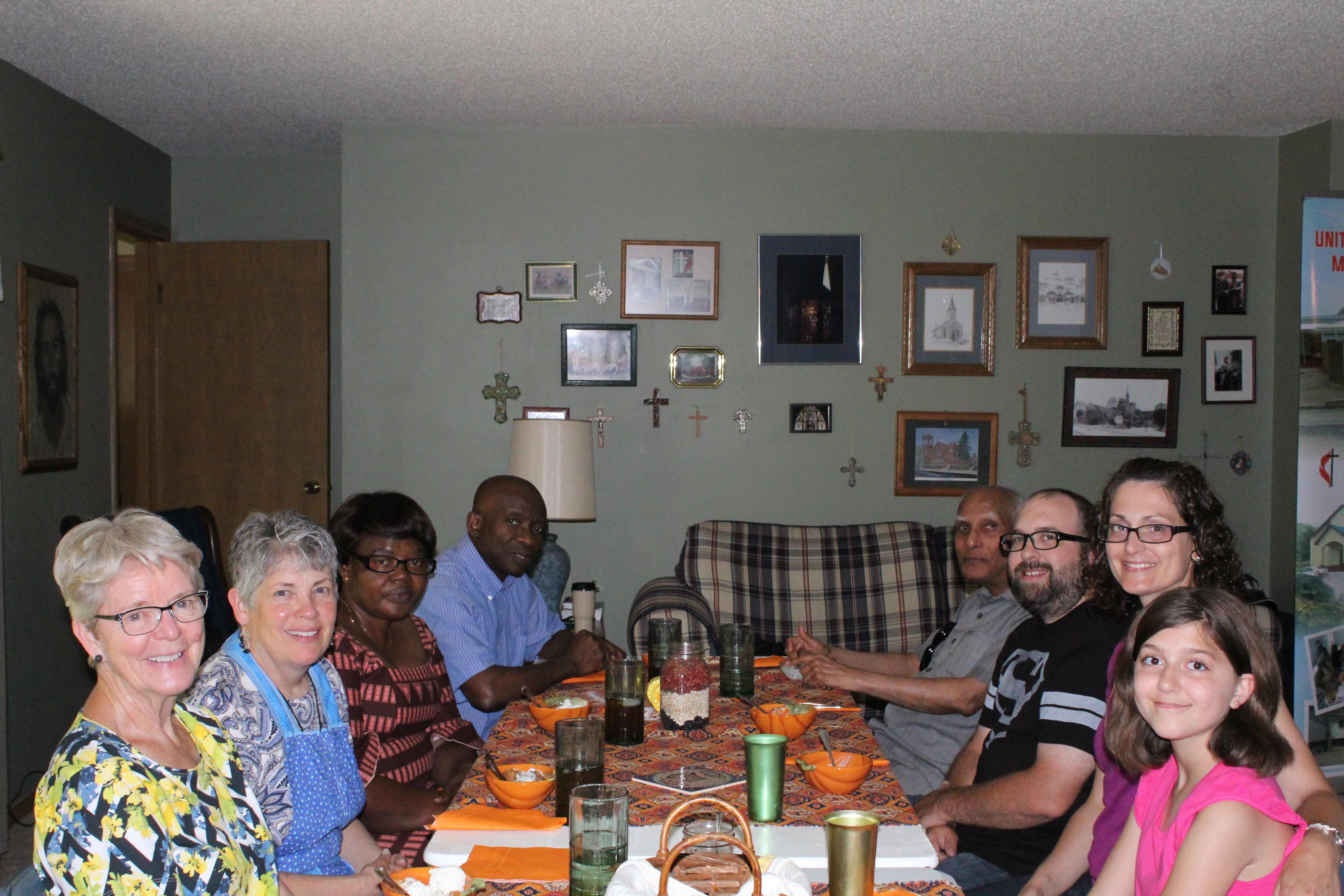By Christina Rice
Medical missionaries from Zimbabwe visited the Maryville United Methodist Church in June.

Gayle Hull, Michelle Moon, Dr. Emmanuel Mefor, Florence Mefor, Ashok Patet, Chris Komorech, Heidi Komorech and Kyannah Komorech visit during a luncheon welcoming the Mefor’s who traveled from Zimbabwe.
Dr. Emmanuel Mefor and his wife, Florence, originally from Nigeria, are missionaries with the Board of Global Ministries of the United Methodist Church. They are stationed at a mission facility in Zimbabwe where they work in the Mutambara Hospital.
Emmanuel is the head of the hospital and as a doctor takes care of all the basic needs of the local residents. Florence is a certified midwife, delivering babies and caring for children under the age of five.
Poor economy
In 2007, the Zimbabwe economy crashed. With one million Zimbabwe dollars equalling one American dollar, there was no food in the country and people were forced to travel to South Africa to buy food, which many people could not afford.
Pregnant women in the area were starving. Babies were dying. Some women lived 25 miles from the hospital, and because there are not many roads or vehicles, they would have to walk to the hospital through mountainous terrain. As a result, many did not come to the hospital to deliver and the infant mortality rate rose.
The area also has a large number of significantly young mothers. Children, whose families can not afford to send them to school, may start their families before they are 13 years old.
Starving mothers
The mission hospital and the government encouraged local women to travel to the hospital at 34 weeks of pregnancy and stay six to eight weeks until they delivered. All this to ensure that a medical doctor would be available during labor. The hospital offered a home where the women could live.
Many women could not afford to stay that long. While they were at the hospital, they could not work to help feed their families and they did not have food to bring with them. As a result, the women were begging for food and many were starving at the complex.
“It’s heartbreaking to see them begging for food in the mother’s shelter. They are forced to choose between eating at home and losing the baby and starving and being at the hospital and saving their baby,” Florence said.
Florence teared up as she talked about watching pregnant mothers pass out from lack of food, many of them going 48 hours without food. Once they passed out, they could offer medical assistance giving them IVs of fluids, only to repeat the procedure a few days later. Many women chose to stay home and risk losing their babies.
Lowering infant deaths
The hospital began feeding the mothers a cornmeal porridge once a day. In 2008, the Mefors traveled to America, visiting churches, asking for financial support to feed the mothers. With the money they raised, they were able to increase the meals to three a day.
When word spread through the community that women would be fed during their six to eight week stay before delivery, the hospital saw the number of women increase from a daily average of 10 to up to 80 women using the facility.
Florence takes care of the women while they are in the shelter, provides education and helps deliver the babies. She also travels throughout the countryside providing post-natal care and immunizations for those who can not make it to the mission. Staff members also deliver medications and supplies to the elderly, sick and those with HIV.
In 2013, the funds for the program began to dwindle. The hospital purchased 247 acres of land and churches donated farming equipment. Now, the hospital raises soybeans, corn, wheat, dairy cows, pigs and chickens in an effort to be self-sustainable.
How to help
The hospital needs to update its birthing center and hospital wards. It needs to raise approximately $30,000 to remodel the facility.
The Mefors have a heart for serving others. They spend approximately $300 of their own money each month to provide food for 24 families in the community who cannot support themselves due to paralysis and other issues. The couple stated if they were to receive more monthly donations, they would invest all the extra income into helping more families in need.
“There are so many. It was hard to choose just 24 to help, but that’s all we could do,” Florence said.
The mission facility also houses a school and a church.
Those interested in helping the Mefors can submit a donation to the Maryville United Methodist Church or contact Chris Komorech at chris@maryvillefumc.org.




Facebook Comments